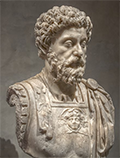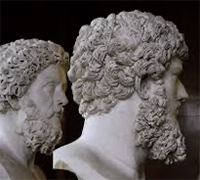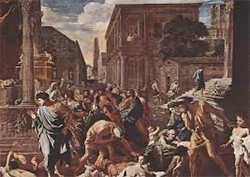The Roman Emperor Marcus Aurelius
Marcus Aurelius was the last of the Five Good Emperors of Rome, ruling in the later 2nd Century. He was known as a philosopher as well as a warrior. 
He was born on April 26, 121, in Rome. His father died when the boy was 3, and young Marcus grew up in the care of his mother and grandfather. His family was wealthy and important, and this combination earned for the boy a top-quality education. He was an earnest student, enjoying the rigors of learning Greek and Latin. His favorite subject of study was philosophy, and he fervently embraced the rational teachings of Stoicism, particular the writings of Epictetus. He had many tutors, including the well-known Marcus Cornelius Fronto. When Marcus was 17, he found himself named as part of an orderly succession desired by the emperor Hadrian. The emperor had originally wanted Lucius Aeilus Caesar to succeed him; however, he died in 138. Hadrian then chose Antoninus Pius as his successor, provided that Antoninus agreed to name his own pair of successors: Lucius's son, also named Lucius, and Marcus Aurelius, who was the emperor's nephew my marriage. The last part of this arrangement was that Antoninus promise to have his daughter, Faustina, marry young Lucius. Hadrian died in 138, and Antoninus took the throne. The new emperor changed the marriage arrangements slightly, betrothing his daughter instead to Marcus Aurelius. In 140, Marcus was elected consul for the first of three terms. He served again in 145 and in 161. Also in 145, he married Faustina; they had 14 children together. 
When Marcus was consul in 161, the other consul was Lucius Verus, his adopted "brother." Emperor Antoninus Pius died in that same year, and Lucius and Marcus became co-emperors. (Technically, Marcus was emperor first and then asked the Senate to bestow on Lucius the status of co-emperor; Lucius, in turn, took Marcus's family name, Verus, as his own.) Unlike the relative peaceful nature of their predecessor's reign, the "brothers" presided over a period of upheaval, both in warfare and in domestic strife. One of the first domestic difficulties facing the new co-emperors was a flooding of the River Tiber that left much of the Eternal City underwater. The damage to many buildings was severe. Many animals drowned, and many people had little food. Lucius and Marcus saw to it that the hungry could eat. Marcus never stopped being a philosopher. In fact, he wrote his own work, Meditations (in Greek), while on campaign during the last decade of his life. The work remains popular in philosophy studies. He was also a skilled legal scholar and enjoyed passing judgments on disputes and petitions. Importantly, he maintained good relations with the Senate, unlike some of his predecessors. Lucius went east to fight against the Parthian king Vologases IV, who had brazenly replaced the Roman governor of Armenia with someone more to his liking and then defeated Roman forces led by the Roman governors of two other provinces, Cappadocia and Syria. Lucius was ostensibly in charge of the army, but he didn't do much of the fighting. Rome prevailed, however, destroying the Armenia capital city of Artaxata and then, in 166, capturing the stronghold of Ctesiphon, in the process razing the royal palace. 
Lucius and the army headed back to Rome, unwittingly bringing with them a devastating disease. The so-called Antonine Plague originated in Mesopotamia and ripped through Asia Minor, Greece, and Italy, claiming what many historians estimate was 10 percent of the Empire's population. Later reports termed the plague smallpox, based on descriptions of the symptoms. 
Lucius himself might have fallen victim to the plague. He became seriously ill on his way from Aquileia to Rome and died, in 169. The most severe challenge to Roman dominance on the frontier came in Germany, in the 160s. A succession of tribes, among them the Lombards and Marcommani and Sarmatians, crossed the Danube or marched into Gaul, intent on finding new homes. After a long struggle, the Romans, with Marcus in the field, were successful at turning back the invasions. A tall victory column, completed in 193, commemorates his victory over the German tribes. Marcus Aurelius was in Vindobona (what is now Vienna) when he died, on March 17, 180. he was 58. His death was not suspicious; rather, he died after living a hard life. He had named his son Commodus Caesar in 166, and the two had ruled jointly from 177. Commodus took the throne after his father died. |
|
Social Studies for Kids
copyright 2002–2026
David White




